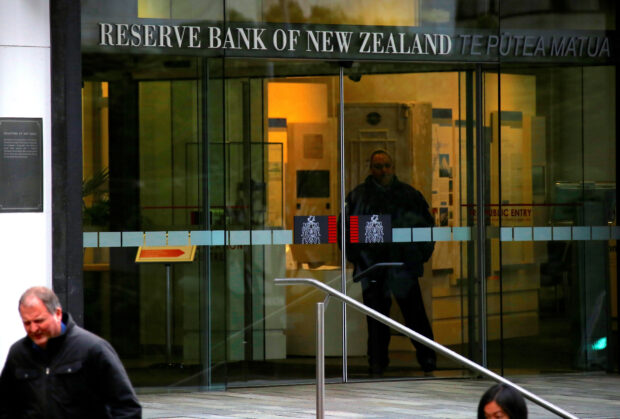
Pedestrians walk past as a security guard stands in the main entrance to the Reserve Bank of New Zealand located in central Wellington, New Zealand, July 3, 2017. REUTERS/David Gray/File photo
WELLINGTON – New Zealand‘s central bank held the cash rate steady at 5.5 percent on Wednesday, but noted inflation remained too high and that further policy tightening might be needed if price pressures did not ease.
The decision to hold the cash rate was in line with expectations from 28 economists in a Reuters poll, all of whom forecast the Reserve Bank of New Zealand (RBNZ) to leave the cash rate at a near 15-year high for the fourth consecutive meeting.
“The Committee is confident that the current level of the OCR is restricting demand,” the statement said. “However, ongoing excess demand and inflationary pressures are of concern, given the elevated level of core inflation.”
Markets read the RBNZ’s commentary as hawkish with the New Zealand dollar shooting up 0.9 percent to $0.6190, two-year swap rates up 15 basis points to 5.23 percent and bank bill futures down as much as 11 ticks.
ASB economists said in a note the central bank’s statement hammered home the point that interest rates need to remain high and could even rise further.
“This message was a shot across the bows of those picking a relatively swift start to the eventual easing cycle,” it said and noted it saw a “high hurdle” for further hikes.
The RBNZ statement added that if inflationary pressures were to be stronger than anticipated, the cash rate would likely need to increase further.
It also raised its forecast cash rate peak to 5.7 percent.
“Interest rates will need to remain at a restrictive level for a sustained period of time, so that consumer price inflation returns to target and to support maximum sustainable employment,” the statement said.
New Zealand‘s decision comes a day after central bankers from the UK, Australia and Spain all flagged the need for monetary policy to remain restrictive for now to defeat rampant inflation.
The RBNZ was one of the first central banks to withdraw pandemic-era monetary stimulus and has lifted rates by 525 basis points since October 2021 to curb inflation. It is the most aggressive tightening since the cash rate was introduced in 1999.
New Zealand‘s annual inflation has come off in recent quarters and is currently 5.6 percent, with expectations that it will return to its target band by the second half of 2024.
The rate hikes have sharply slowed the economy but recent data showed it was tracking above central bank expectations.
The RBNZ decision is the first since New Zealand elected a new government headed by Prime Minister Christopher Luxon last month.
The new center-right government has said it will return the central bank to a single inflation targeting mandate, removing the requirement for the RBNZ to consider employment when setting the cash rate

